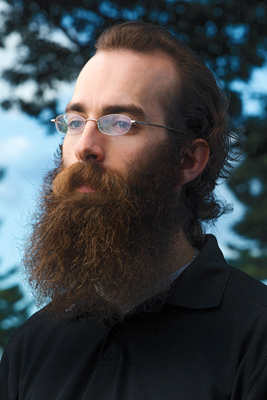By Katherine Duke ’05
Tim Gaura ’15E argues in his senior project that Amherst students should talk more about their religious and philosophical views.
[Students] There are a lot of things about Tim Gaura ’15E that make him a highly visible presence at Amherst. For one, he gets around on a unicycle. At 28, he’s older than most of his classmates. Plus, he sports a year’s growth of facial hair—his “thesis beard.”
And not least is the senior project for which the beard is named. This paper is prompting much interest and discussion throughout the Amherst community—because it’s about the community, and about a subject that, Gaura says, we don’t discuss enough.
Specifically, his project posits that Amherst students spend too little time talking about their religious and philosophical beliefs and identities. Through a survey answered by some 150 students and dozens of in-person interviews, he’s found that students are often hesitant to converse with one another about the frameworks through which they seek answers to life’s deepest questions.

Gaura, left, has spent a year growing out his “thesis beard.”
Gaura, who was homeschooled starting in fifth grade by his conservative Christian family and who transferred to Amherst from Monroe Community College in Rochester, N.Y., has found Amherst unusual in this reticence. At other schools where he’s taken classes—including Scotland’s University of St. Andrews and the Hebrew University of Jerusalem—people seemed to him much more comfortable with declarations and discussions of faith or philosophy. He views that comfort as a positive, and he argues that Amherst students’ comparative silence on these topics means they miss out on opportunities to learn from and empathize with one another.
He received funding for his project (which started as an anthropology thesis and became an interdisciplinary Special Topics project) through the college’s Gregory S. Call Undergraduate Research Program, and he’s completing it this semester with guidance from Deborah Gewertz, the G. Henry Whitcomb 1874 Professor of Anthropology; Writing Associate Michael Keezing; and Michele Barale, the Thalheimer Professor of Sexuality, Women’s and Gender Studies and co-director of the Writing Center. The final written work will include Gaura’s personal narrative of faith and learning, incorporate the stories of students he interviewed and draw from research into the religious history of the college.
Gaura intends the writing to be more accessible than a traditional academic thesis would be. He plans to invite students, faculty and staff to a campus event in December at which he’ll describe the project and its findings, answer questions and perhaps facilitate a broader discussion of these issues.
And he has another, more private post-project ritual in mind: to symbolize “shedding the weight of my undergraduate, sophomoric years and re-emerging,” he will shave off his beard.
Rob Mattson photo